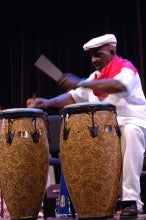Highlights from the Ethnomusicology Archive: Francisco Aguabella

The legendary Francisco Aguabella (1925-2010) was an Afro-Cuban percussionist and master sacred drummer of the Santeria religion. Aguabella was born in Matanzas, Cuba, but immigrated to California in 1953 to work with dancer and choreographer Katherine Dunham on the movie Mambo. He went on to perform with Dizzy Gillespie, Tito Puente, Peggy Lee, Frank Sinatra, Eddie Palmieri, Carlos Santana, the Doors, and many others. In 1992, he received a National Heritage Fellowship from the National Endowment for the Arts. He was featured in the 1995 documentary Sworn to the Drum: A Tribute to Francisco Aguabella. In the film, art historian Robert Farris Thompson called Aguabella "a virtual Rosetta stone of African culture." Jazz legend Dizzy Gillespie said of him, "Aguabella is the John Coltrane of the Conga Drums." Aguabella directed the UCLA Ethnomusicology Afro-Cuban Music Ensemble from 1995 to 2009.
I am certain many of you remember Aquabella and the Afro-Cuban ensemble. Three of the ensemble's performances from the UCLA Ethnomusicology Spring Festival of World Music and Jazz are available at the California Light and Sound Collection on the Internet Archive. California Light and Sound is a project of the California Audiovisual Preservation Project (CAVPP). And, of course, you can always browse the Ethnomusicology Archive channel. You can view these Spring Concert videos, below, as well as a scene from Mambo and the film, Sworn to the Drum.
UCLA Ethnomusicology Spring Festival of World Music: Afro-Cuban Music, 2007
UCLA Ethnomusicology Spring Festival of World Music: Afro-Cuban Music, 2000
UCLA Ethnomusicology Spring Festival of World Music: Afro-Cuban Music, 1997
Katherine Dunham, dancing, with Francisco Aguabella, drums, in Mambo (1954).
Sworn to the Drum: A Tribute to Francisco Aguabella, directed by Les Blank (1995) -- Start at 00:24 to skip the ad!





